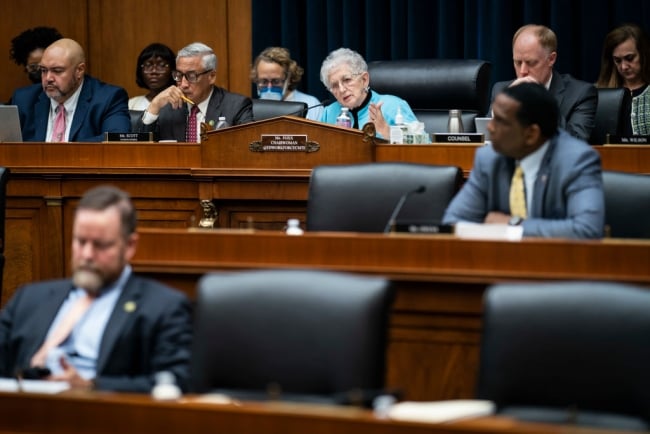You have /5 articles left.
Sign up for a free account or log in.

North Carolina Representative Virginia Foxx, the Republican chair of the House Education and Workforce Committee, has said that the issues with the FAFSA are “another instance of the Biden administration steaming out of the harbor in a boat with holes in it.”
Photo by Jabin Botsford/The Washington Post via Getty Images
The botched launch of the new Free Application for Federal Student Aid (FASFA), which has disrupted college admissions deadlines and shaken confidence in the Education Department, came under scrutiny Wednesday on Capitol Hill.
The House higher education subcommittee is examining how the FAFSA rollout, plagued by a series of delays and technical glitches, is impacting students, families and institutions. You can watch its hearing below, and scroll down for our live analysis as it happened.
This hearing will likely be the first of several on the topic as lawmakers, particularly Republicans, have grown increasingly frustrated with the Biden administration’s handling of the new FAFSA. Congress ordered the department to simplify the form, which unlocks billions in federal, state and institutional aid for millions of students annually, in December 2020. Some lawmakers have said that the Biden administration put its own priorities, such as student debt relief, over the legislative mandate. The Government Accountability Office is currently investigating the launch.
Read More: How Ambitious Plans for the New FAFSA Ended in Fiasco
“The Education Department’s FAFSA rollout has been defined by poor communication, negligence, and incompetence that has wreaked havoc on the entire university system,” said Utah representative Burgess Owens, the Republican chair of the subcommittee, in a statement ahead of the hearing. “FAFSA delays have left millions of students in limbo, unsure of their academic futures and unable to access additional guidance or assistance.”
While improving the FAFSA was supposed to make college more accessible for students, college officials and experts worry that the problems with the overhaul could instead drive some prospective students away.
So far, 27 percent of high school seniors have completed a FAFSA and FAFSA completions are down by about 40 percent, according to the National College Attainment Network.
The new form is part of a broader overhaul of the financial aid system that includes changing the formula that determines how much money a student gets to, in part, expand eligibility for the Pell Grant. The Education Department estimates that more than 610,000 low-income students will have access to the Pell Grant due to the new system, a nearly 10 percent increase.
Testifying before the subcommittee were Justin Draeger, president of the National Association of Student Financial Aid Administrators (NASFAA); Kim Cook, chief executive officer of the National College Attainment Network (NCAN); Mark Kantrowitz, a financial aid expert and consultant; and Rachelle Feldman, vice provost of enrollment at the University of North Carolina at Chapel Hill. Education Secretary Miguel Cardona was also at the Capitol today, speaking to a subcommittee of the House Appropriations Committee about the President’s budget request for fiscal year 2025.
Lawmakers Vent Their FAFSA Frustrations, Promise More Hearings
12:45 p.m. The two-hour hearing concluded on a sour note with Representative Burgess Owens, the Republican chair of the higher education subcommittee, questioning the entire purpose of the Education Department.
“Most Americans think it’s to educate,” Owens said. “Over the last three years, leaders in the Department of Education have brought pure chaos to students seeking an education and to institutions whose mandate it is to provide an education. Leadership in the department has been distracted, undisciplined and arrogant.”
Questions and statements over the course of the hearing highlighted bipartisan frustration with the FAFSA roll-out, though Democrats were unsurprisingly more hesitant to directly criticize the Biden administration.
The majority Republicans, who pledged to ramp up oversight, indicated that more hearings are on the horizon. And the education secretary is likely to be called.
“Now is the time for Secretary Cardona to explain his abysmal leadership to the American people,” said North Carolina representative Virginia Foxx.
Witnesses who testified were generally disappointed in the FAFSA launch, though some were more critical of the department’s handling of the project.
Financial aid expert Mark Kantrowitz and Justin Draeger, president of NASFAA, both gave the Biden administration an “F” when asked to grade the roll-out.
Kim Cook graded it a “C” while Rachelle Feldman gave it a “D” for “disappointing.”
“I’m old enough to remember the paper applications,” Feldman said. “Hopefully this will be a little bit better than that when it’s done.”
The witnesses also questioned whether issues with the form will be addressed in time for a smooth launch Oct. 1, when the next FAFSA is supposed to open. Typically, by this time of year, the Education Department has released a draft version of the application.
“I lack confidence that they aren’t going to have to delay the FAFSA,” Kantrowitz said.
Democrats: ‘No One Is Happy’
12:30 p.m. While Republicans called for accountability, Democrats on the subcommittee have been more focused in the hearing on how to help this year’s class of students complete the FAFSA form and get access to aid. They’ve stressed the need to support students to ensure they can go to college and expressed concerns about how all the issues could affect low-income students.
At the same time, Democrats were not downplaying the extent of the crisis.
“No one on either side of the aisle is happy with what’s going on,” Virginia Representative Bobby Scott said, summing up the bipartisan sentiment.
Republicans: ‘There Is No Accountability’
11:55 a.m. Republicans on the subcommittee clearly want to hold the Biden administration accountable for its handling of the new FAFSA, but they’re not quite sure how to do it. Members asked witnesses about potential consequences—should somebody lose their job?—and for insights into who should be called next to testify before the panel.
Mark Kantrowitz, a financial aid expert and consultant, suggested that the committee call Richard Cordray, chief operating officer for Federal Student Aid, to testify. Justin Draeger, president of NASFAA, said that Congress should look into the hiring practices and the contractor, adding that the committee is already “off to a good start” by requesting a GAO investigation.
“The committee has the responsibility to explore whether there should be ramifications felt as it relates to those questions,” Draeger said in response to the question about whether someone should be fired. “If there was a financial aid director or college president who delayed financial aid for six months on their campus, the professional price that would be paid would be pretty steep.”
Lawmakers from both parties said they want to ensure the problems don’t recur. Some Republicans, however, were skeptical of Congress’s power to force change in this area.
“They fail again and again, and there is no accountability,” said Representative Brandon Williams of New York. “They ignore Congress and the will of the people.”
‘Day That Lives in the Collective Trauma’
11:30 a.m. Justin Draeger, president of the NASFAA, said the issues with the roll-out have created a crisis of credibility for the department and paralyzed colleges and universities.
“When you have a crisis of credibility issue, schools don’t trust that more errors won’t be found, that guidance won’t change tomorrow, or that the data they have is correct,” Draeger said. “Schools are trying to figure out what to do: Not because ED is purposefully misleading anyone, but because ED itself may not know where all of the issues lie.”
Draeger and other witnesses used their opening remarks to detail the series of errors and delays that have defined the roll-out. That includes the department’s Jan. 30 announcement that it wouldn’t be sending students’ financial aid information to colleges until March. That information is usually sent to colleges within 1 to 3 days after a student completes the form.
“January 30, 2024, will be a day that lives in the collective trauma of most financial aid offices across this country,” Draeger said. “January 30 wasn’t the first day of bad news, by far. But it was the straw that broke the camel’s back that turned this hardship into a crisis.”
‘Enough With the Sunshine and Rainbows’
11:15 a.m. Witnesses didn’t mince words in their opening remarks.
“The delayed opening and processing, and reprocessing, of applications mean most high school seniors have yet to receive an aid offer,” said Kim Cook, chief executive officer of NCAN. “They are being asked to commit by May 1. Our greatest fear is that they will decide they can’t.”
Rachelle Feldman, vice provost of enrollment at the University of North Carolina at Chapel Hill, said her institution has yet to release a single financial aid offer to students because of the issues with the launch. She said the department’s communications have sugar-coated the issues with the form.
“Enough with the sunshine and rainbows,” Feldman said. What colleges need for the department are “straight talk and timely solutions” to help students get money for colleges.
Leading Lawmakers Decry FAFSA Delays, Issues in Opening Statements
10:45 a.m. Utah Representative Burgess Owens, the Republican chair of the higher education subcommittee, kicked off the hearing by saying the Education Department’s Office of Federal Student Aid shouldn’t receive a dollar more until “we figure this out.”
“It is unfathomable to me that the Office of Federal Student Aid received over $2 billion dollars last year,” Owens said in his opening remarks. “So, in essence the American taxpayer has paid two billion to give their children a year or more of chaos and anxiety. FAFSA was created in 1992 with the HEA Reauthorization Act. We’ve had 32 years of a functioning system that served hundreds of millions of students and thousands of institutions. Within three years, Biden’s Department of Education has managed to bring the Education industry a possible game-changing crisis.”
The Office of Federal Student Aid did not receive additional funding to support the development and implementation of the new FAFSA.
Owens said the roll-out of the new form has been “mired in delays and dysfunction” and “threatens to damage students, families, and institutions.”
“New errors are seemingly revealed every week, and there may even be a new one by the time this hearing is over,” he said.
The ranking Democrat on the subcommittee, Florida Representative Frederica Wilson, agreed that the FAFSA launch has been mishandled and overly complicated this admissions season for students who needed information about financial aid “months ago.”
“While I agree that holding the department accountable and investigating its mishandling is crucial, our immediate priority must be ensuring that students and families have necessary resources to make decisions,” she said. “Students need answers now.”
Education Department Shares New Data
10 a.m. Ahead of the hearing, the Education Department released new data this morning about issues with the FAFSA launch and shared more details about the timeline moving forward.
Up to 16 percent of the 7 million applications submitted so far will need to be corrected by a student or family before the Education Department can proceed with processing those forms. That’s on top of about 30 percent that are affected by calculation and tax errors. The department said the students should be able to correct their applications early next week.
Fixing the other 30 percent of applications will take more time, the department acknowledged. The biggest chunk of applications are affected by an error in how tax information was transferred from the Internal Revenue Service, and the department is aiming to reprocess those records by May 1. The rest should be processed by next week.








